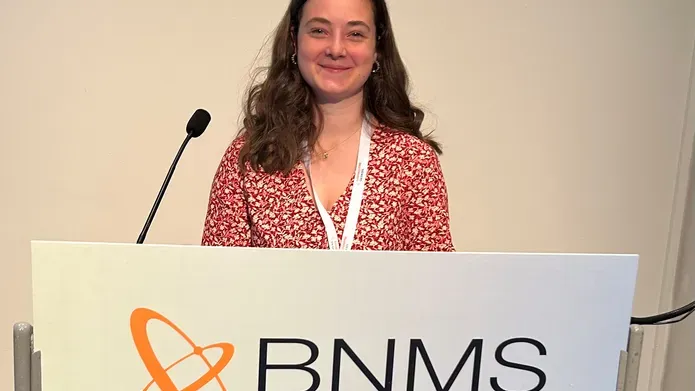News
Dundee School of Medicine alum wins national essay prize from British Nuclear Medicine Society
Dr Abby Lang was ‘shocked and honoured’ to present her work to over 600 experts at the society’s prestigious Spring Conference
Published on 4 June 2025

A recent graduate of the University of Dundee School of Medicine has won the 2025 British Nuclear Medicine Society (BNMS) national medical trainee essay prize, earning a speaking slot at the organisation’s flagship Spring Conference.
Dr Abby Lang, who graduated in 2024 and now works as a foundation year one (FY1) doctor in NHS Tayside, was selected for her essay titled “CXCR4-Targeted Therapy in Haemato-oncology.”
Her work explored the potential use of CXCR4-targeted radiopharmaceuticals - a developing class of imaging and treatment agents - in the diagnosis and management of blood cancers.
The competition invited submissions from medical trainees across the UK, challenging entrants to consider “Future Interesting Developments in Nuclear Medicine.” Dr Lang impressed judges with her forward-thinking application of nuclear imaging to her intended specialty of haematology.
Following her presentation, Dr Abby Lang said, “It was an incredible experience and a fantastic opportunity to share my ideas with professionals from across the field,”
“Winning this essay prize has been such a confidence boost at the start of my medical career. It was quite an honour to be given that platform to speak to so many specialists. It can be quite tricky as a junior doctor to get these types of opportunities, so it really meant a lot.”
A Dundee local, Dr Lang says she intends to continue her medical career in the region, with hopes to pursue specialist training in haematology and a continued focus on research and innovation.
The BNMS Spring Conference is the UK’s leading event for nuclear medicine and molecular imaging, attracting clinicians, researchers and technologists from around the world. This year it was held at the SEC in Glasgow.
What are CXCR4-targeted radiopharmaceuticals?
These are a new type of radioactive medicine designed to find and treat certain cancers more precisely. They work by attaching to a protein called CXCR4, which is often found on blood cancer cells. This allows doctors to detect the cancer more clearly on scans, or in some cases, deliver radiation therapy directly to the tumour.